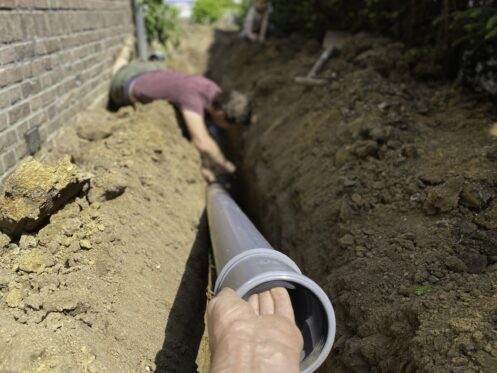Sewer lines are responsible for the safe disposal of wastewater, ensuring it exits your home and does not cause damage. Unfortunately, due to sewer lines’ hidden nature, they often go neglected until a problem, such as a clog or a busted pipe arises. Sewer line problems are more common than homeowners realize and cause extensive damage to your plumbing system and home if left unchecked. Regular sewer line maintenance and repair are necessary to ensure the lines are in good operating condition and to prevent costly repairs or replacements in the future. During the cold season, it is imperative to be vigilant about your home’s sewer line. Here are signs that warrant a sewer line inspection during winter.
1. Foul Smell
As the temperatures drop during the cold months, the risk of sewer line damage increases. One telltale sign that your sewer line may be in trouble is the presence of unpleasant odors. If you’ve noticed a persistent foul smell from your drains or near your plumbing fixtures, it could be a sign of a blockage or breakdown in your sewer line.
2. Frequent Toilet Backups
A blocked toilet can result from flushing non-degradable materials or a buildup of waste and debris in the pipes. Frequent backups indicate an issue with the plumbing system, such as tree root intrusion or poor pipe installation. To prevent backups, avoid flushing anything besides toilet paper and human waste, and have regular drain cleaning services performed by a professional plumber.
3. Slow Draining Sinks and Tubs
Slow-draining tubs and sinks may seem minor, but they can lead to bigger problems if left unaddressed. The culprit behind this common issue is often a buildup of soap scum, hair, and food debris in the pipes. While a plunger or drain snake may offer a temporary fix, it’s important to address the root cause by calling a professional plumber. They will assess and resolve the issue before it becomes a major plumbing emergency.
4. Lush Spots
Noticing lush spots in the lawn is an indicator that there may be a problem with your home’s sewer system. In these areas, grass will look much greener and healthier than other lawn parts due to more moisture and nutrients from the wastewater seeping into the soil. It is also common for these patches of grass to have a foul odor. If you notice any of these signs, you should immediately contact a professional for an inspection and repair. Sewer line problems can be caused by tree roots, shifting soil, or age-related deterioration of pipes. Ignoring the problem leads to extensive damage from foundation issues and flooding in the yard. A professional can assess the situation, identify its seriousness, and repair it.
5. Low Water Levels
Low water levels occur when water is not flowing as it should and could be caused by a blockage or clog in your sewer line. This issue can lead to an odorous and unsanitary situation and should be addressed by a professional as soon as possible.
Effects of Cold Weather on Sewer Systems
As temperatures drop during winter, homeowners may deal with plumbing problems they never anticipated. Here are the most common effects of cold weather on the plumbing systems.
1. Frozen Pipes
When temperatures drop below freezing, the water inside the pipes begins to freeze and expand. It puts pressure on the pipes, causing them to crack or burst. It leads to plumbing issues like backups and flooding and can cause extensive property damage.
Preventing Frozen Sewer Pipes
Some tips for preventing frozen sewer pipes include ensuring the sewer line is buried below the frost line. Always work with professional plumbers when laying your sewer lines to determine the location and depth of the line. Prevent water freezing in the pipes by keeping them flowing. The pipes will not freeze and burst when water flows constantly through the drainage. Always maintain a clean roof and gutters to avoid leaves, twigs, and dirt entering the drainage system.
2. Root Intrusion
When the ground freezes, tree roots push and expand in search of moisture, causing damage to underground pipes and drainage systems. This problem is costly to repair and poses a health hazard to homeowners.
How to Prevent Root Intrusion
Preventive measures such as regular maintenance and inspections identify and address root intrusion early enough. Using root barriers can help prevent roots from growing into pipes. Copper sulfate septic treatments are the most common preventive measure. This method creates a poison barrier within the soil that kills the tree roots before they can grow into the septic field lines.
3. Frozen Sewer Vents
Sewer vents (also known as vent stacks) are plumbing components that provide an exit point for gases to escape from a sewer system. Sewer vents are placed on the roof of buildings and houses, as this is the system’s highest point. The purpose of these vents is to prevent the buildup of sewer gases and odors in the drains and travel back into the living spaces of a home. Sewer vents also maintain adequate air pressure in the drain system, which is necessary for proper drainage.
When the sewer vents freeze, pressure in the system will build up, resulting in the backflow of wastewater and sewage into living spaces. The pressure buildup can also cause pipes to burst or leak, leading to flooding and property damage.
Preventing Frozen Sewer Vents
Ensure good insulation around the vent pipes to prevent frozen vents. Use pipe insulation sleeves or cover the exposed vents with blankets or tarps.
4. Frozen Septic Tank
A septic tank is a self-contained, underground chamber used to contain and treat wastewater. It holds the solid matter and scum layer while letting the liquid effluent filter into a leach or drain field below. The tank retains solids and organic matter from wastewater sources like showers, toilets, and laundry machines. It’s important to keep the septic tank clean and well-maintained to prevent clogging and damage.
When temperatures fall below freezing, the water in the tank may form ice, blocking the tank’s inlet and outlet pipes and preventing wastewater from flowing out. This will lead to backed-up wastewater in your home or yard and potential flooding and damage to your system, lawn, and landscaping. Regular maintenance and pump-outs are essential to keeping a functional septic system. Homeowners should also be mindful of what they flush down the drain and avoid using harsh chemicals that can harm the system.
Professional Plumbers
Sewer lines are one of the most neglected parts of a household. Ensure your sewer line is in good condition to prevent a plumbing disaster. Contact professional plumbers to inspect your sewer line during this season. They have the equipment and expertise to detect and fix any underlying problems before they escalate into costly sewage backups.
Hope Plumbing conducts professional plumbing inspections and maintenance services. We also install plumbing fixtures and faucets for your sump pump, water heater, and toilets. Our plumbers are well-versed in leak detection and repairs. Contact Hope Plumbing for more information.

